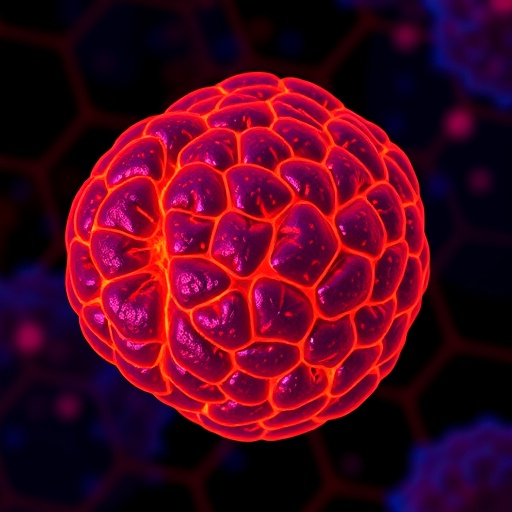In a groundbreaking study that advances the understanding of prostate cancer, researchers have employed histology-resolved proteomics to elucidate the distinctive characteristics of tumor and stromal profiles in both low-grade and high-grade prostate cancer. Conducted by an esteemed team led by Hunt A.L., this research not only sheds light on the complexities of prostate cancer pathology but also holds the potential to guide future therapeutic approaches.
The pioneering methodology used in this study integrates histological analysis with advanced proteomic techniques, allowing scientists to resolve specific protein expressions distinctly associated with different tumor grades. By dissecting these profiles, the researchers aimed to unveil the intricate molecular mechanisms underpinning prostate cancer’s progression. The implications of this work could significantly enhance the current diagnostic frameworks, providing more precise classifications of cancer types based on their proteomic signatures.
Moreover, one of the central tenets of this study is the critical distinction between tumor and stromal components. While previous research often grouped these elements together, the current analysis specifically isolates these components, providing insights into their interplay. This focus on the stroma, the supportive tissue that influences tumor behavior, marks a pivotal shift in how cancer research is approached. Understanding the differences in protein expression between low-grade and high-grade tumors can reveal why some tumors are more aggressive and resistant to standard treatments.
The findings articulated in this research are anticipated to have significant implications for the clinical management of prostate cancer. Currently, cancer grading heavily relies on histological examination; however, integrating proteomic data enhances the accuracy of grading systems. This could lead to more personalized treatment protocols as oncologists gain better tools to predict tumor behavior and patient outcomes based on precise molecular profiles rather than broadly defined histological categories.
Additionally, this study emphasizes the importance of individual variability in cancer. By characterizing the tumor and stroma on a proteomics level, it highlights that there is no one-size-fits-all solution to cancer treatment. Each patient’s tumor presents unique characteristics, and understanding these differences at the molecular level could revolutionize treatment paradigms. Targeted therapies may be developed based on these proteomic signatures, promising more effective and customized interventions.
In terms of methodology, the researchers implemented an innovative approach combining mass spectrometry-based proteomics with advanced imaging techniques. This allowed for the simultaneous analysis of multiple proteins in their native histological context, providing a comprehensive landscape of protein expression across different tumor grades. The use of high-resolution imaging ensures that the spatial relationships between proteins can be explored, providing deeper insights into how these molecules interact within the tumor microenvironment.
Furthermore, the study goes beyond just identifying protein markers; it aligns these findings with clinical outcomes. By correlating specific proteomic profiles with patient prognosis and treatment responses, the researchers lay the groundwork for developing biomarker panels that could facilitate early detection and intervention strategies. Such advancements could be particularly valuable in identifying patients who may be at higher risk for aggressive disease, thereby allowing for earlier intervention.
This research embodies the potential of proteomics as a transformative tool in oncology. As the field of cancer research continues to evolve, studies like this one bridge critical gaps between molecular science and clinical application. By fostering collaborations between pathologists and molecular biologists, a more integrative understanding of cancer biology can emerge. This collaborative effort emphasizes the need for interdisciplinary approaches in the fight against cancer.
Notably, the implications of this work extend beyond prostate cancer. The methodologies developed through this research could be applicable to a variety of malignancies, providing a broader framework for understanding tumor biology in general. The potential for cross-cancer comparisons could yield insights into common pathways and treatment resistance mechanisms that underlie various tumor types.
The ultimate goal of this pathway-breaking research is clear: to empower clinicians with knowledge that can transform patient care. As the authors discuss, the integration of these advanced proteomic techniques into routine clinical practice could change the landscape of cancer diagnostics and therapeutics. This holistic understanding of tumor biology is poised to enhance the precision of medical interventions and improve patient outcomes.
As we reflect on the implications of these findings, it becomes crucial to consider the ethical dimensions of such advancements. The ability to stratify patients based on detailed molecular profiles raises questions about access to personalized therapies and the equity of care provided in different demographic populations. Addressing these disparities will be paramount as we move forward in the age of precision medicine.
In conclusion, Hunt et al.’s research marks a significant milestone in the ongoing battle against prostate cancer. By unraveling the complex interplay of proteins within tumor and stromal environments, it not only provides a clearer picture of disease pathology but also offers promising avenues for future therapeutic strategies. The implications of such research are far-reaching, potentially enhancing the landscape of cancer diagnostics and paving the way for more effective treatments tailored to individual patient profiles.
Ultimately, this study serves as a reminder of the relentless pursuit of knowledge within the scientific community. As investigators continue to peel back the layers of cancer biology, the hope remains that every new discovery brings us one step closer to conquering this pervasive disease.
Subject of Research: Prostate Cancer Proteomics
Article Title: Histology-resolved proteomics reveals distinct tumor and stromal profiles in low- and high-grade prostate cancer.
Article References: Hunt, A.L., Barakat, W., Makohon-Moore, S.C. et al. Histology-resolved proteomics reveals distinct tumor and stromal profiles in low- and high-grade prostate cancer. Clin Proteom 22, 14 (2025). https://doi.org/10.1186/s12014-025-09534-8
Image Credits: AI Generated
DOI: 10.1186/s12014-025-09534-8
Keywords: Prostate cancer, proteomics, tumor biology, histology, personalized medicine, biomarker, cancer progression.
Tags: advanced proteomic techniquescancer diagnostic frameworksdistinct protein expressionshistology-resolved proteomicsHunt A.L. research teamlow-grade vs high-grade cancermolecular mechanisms of cancer progressionprostate cancerprostate cancer pathologytherapeutic approaches for prostate cancertumor and stroma profilestumor microenvironment interactions





